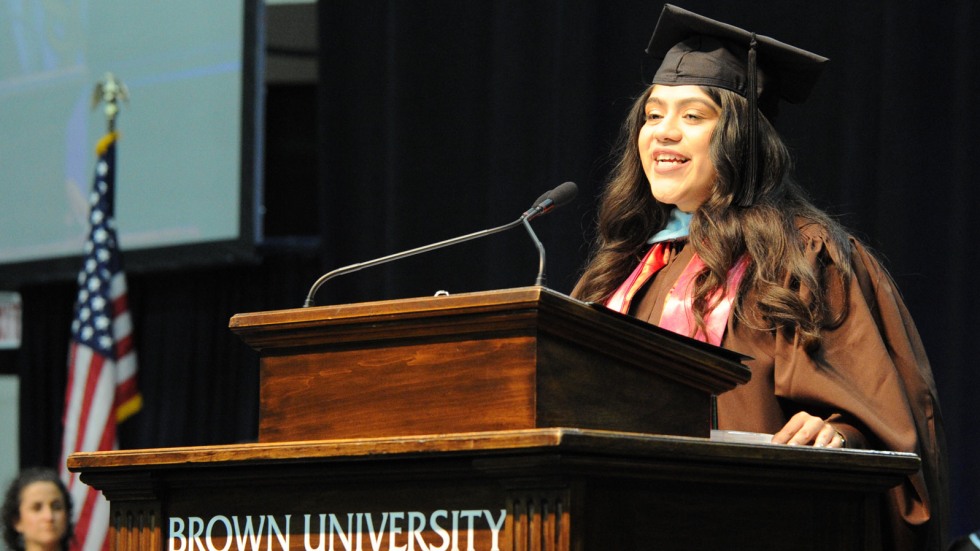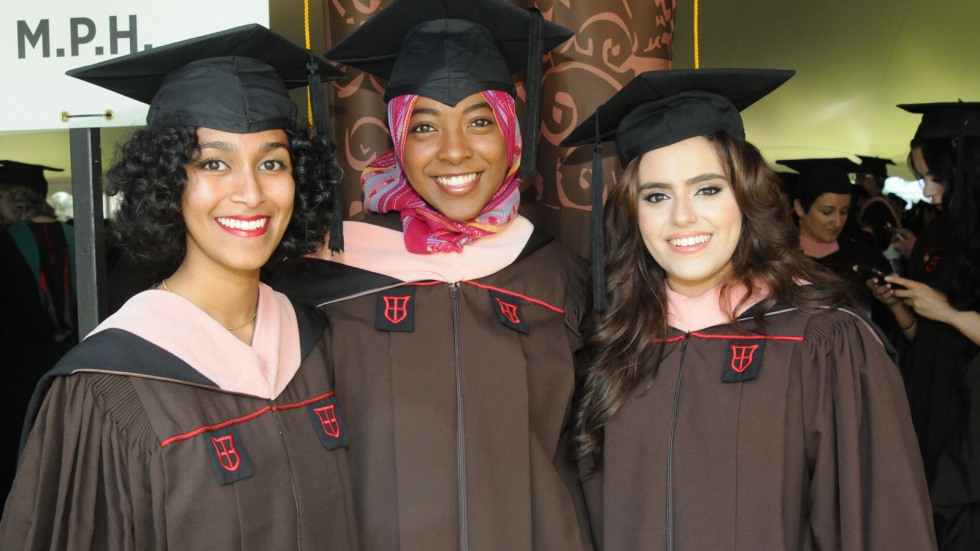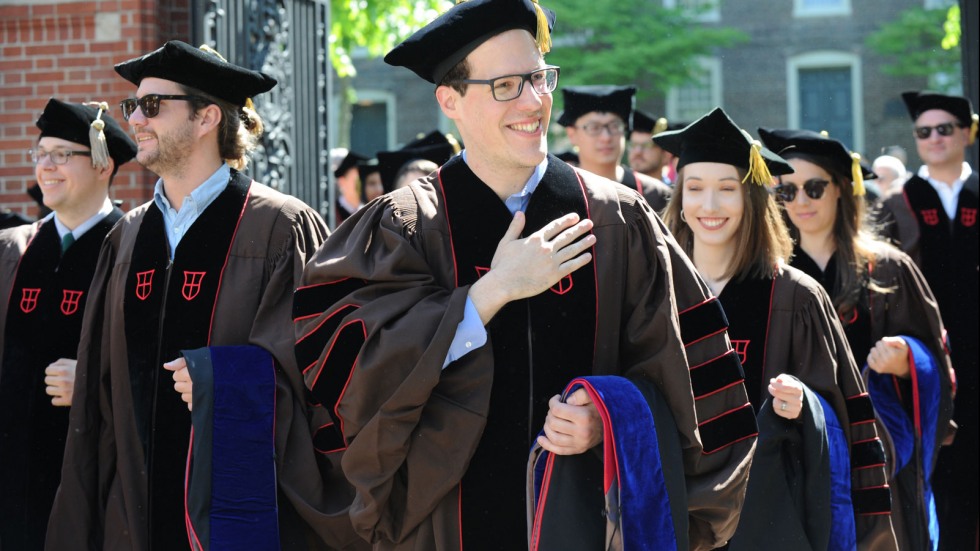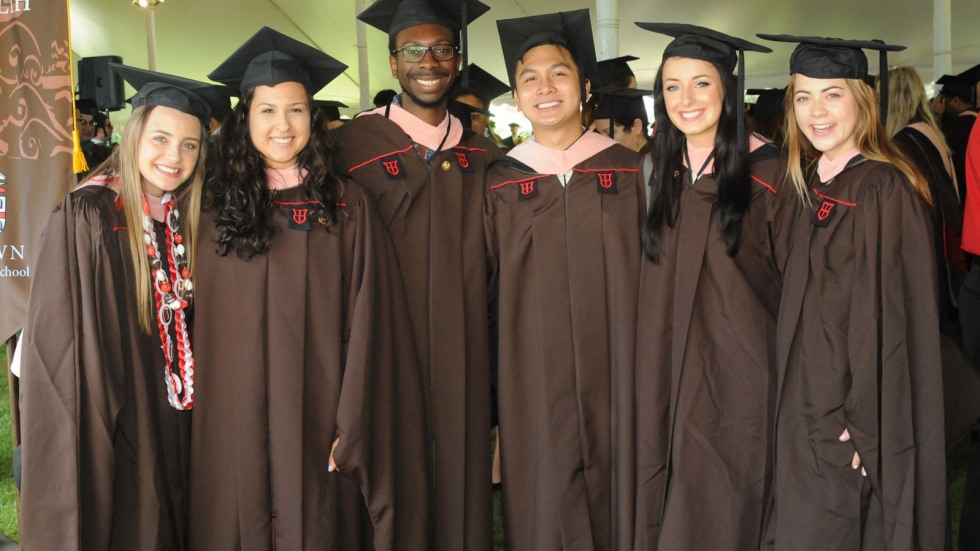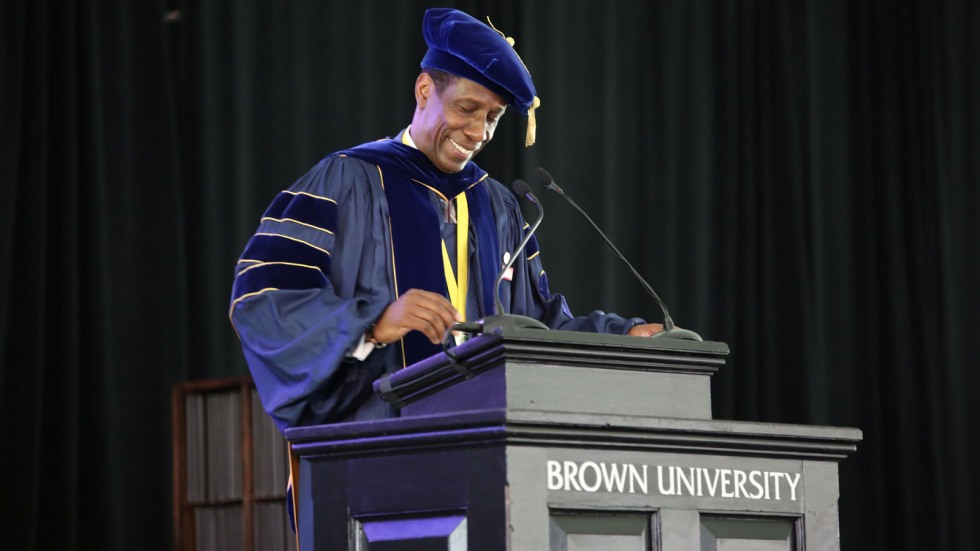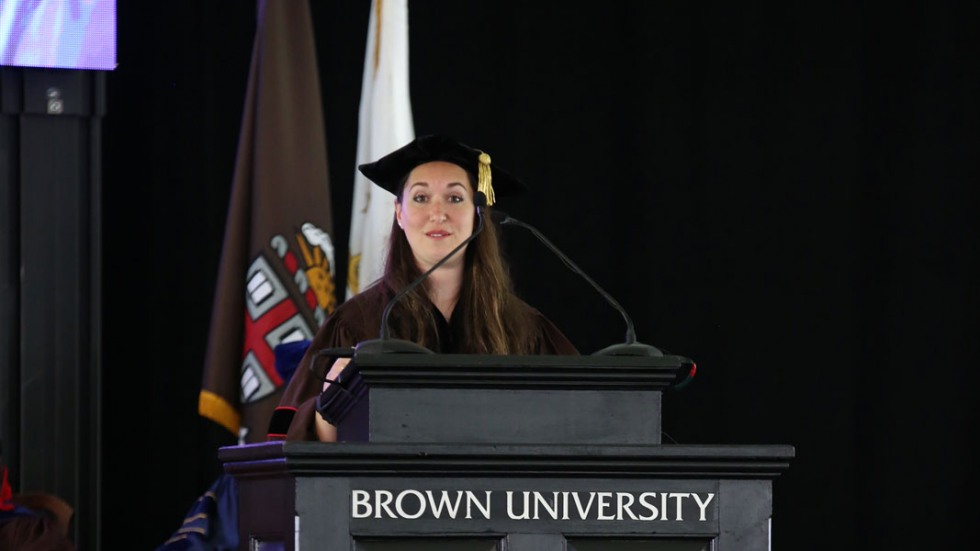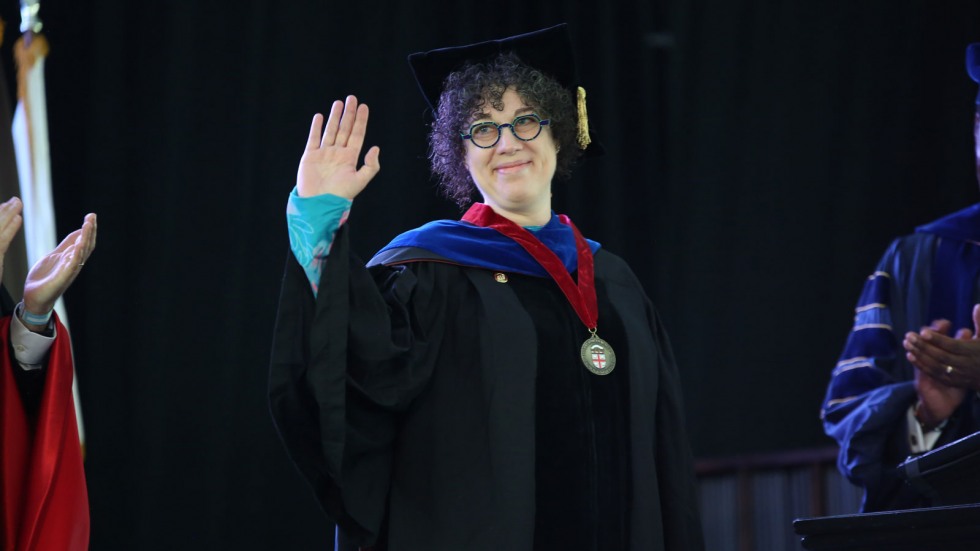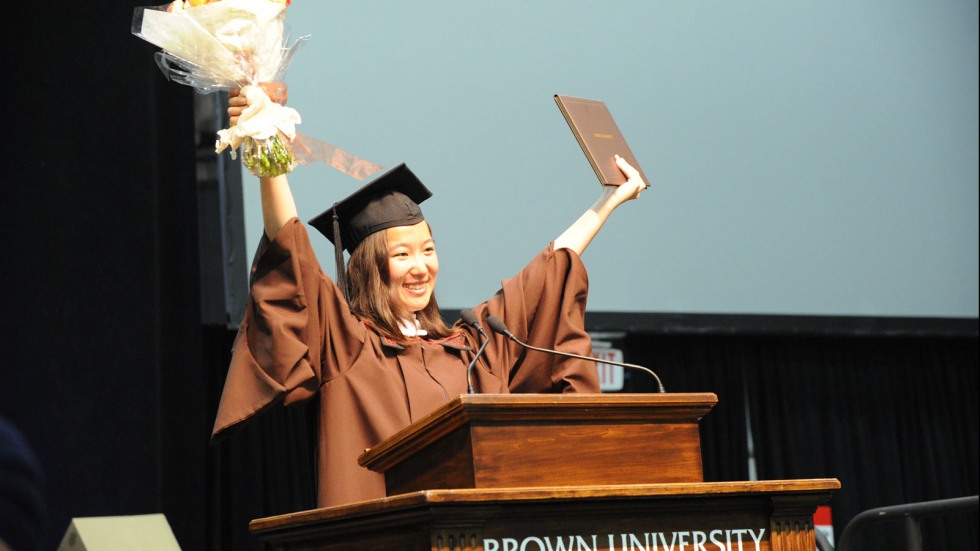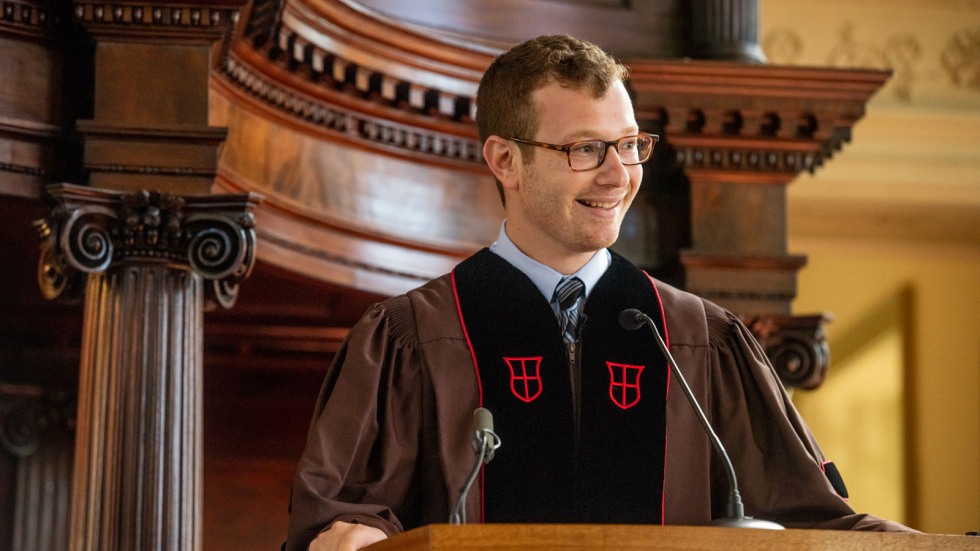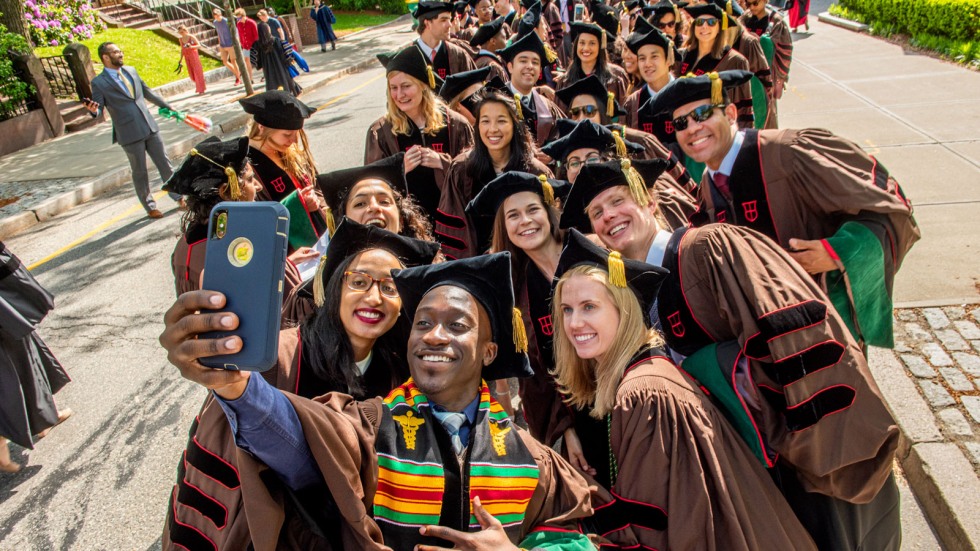PROVIDENCE, R.I. [Brown University] — In three ceremonies held on Sunday, May 26, Brown University celebrated the academic achievements of 1,199 master’s, doctoral and medical students and awarded them their degrees.
The master’s ceremony, held in Meehan Auditorium, celebrated a record number of master’s graduates totaling 846. In an address to her gathered classmates and their families and friends, student speaker Eunice Gonzalez-Sierra thanked her parents, who “crossed the border so I could cross this stage.”
It was from her parents, who made a living picking strawberries in the fields of Santa Maria, California, that Gonzalez-Sierra first learned the value of hard work, she said.
“Mami and papi taught me hard work because they lived it,” she said. “They taught me that my education would liberate us from our poverty. So today, I thank them, like many of our loved ones, for leading the way in getting us here.”
The first in her family to earn an advanced degree, Gonzalez-Sierra was awarded a master’s in education. She extended thanks to the Undocumented, First-Generation College and Low-Income Student Center, where she found a community of supportive peers.
“I dedicate this speech to my U-FLi community…” she said. “[They are] the ones who know the struggle of immigration policies that continue to wound us and the ones we love most; the first-generation college graduates who may have been the first to receive a bachelor’s degree and are the first to receive a graduate degree today. This moment is dedicated to those of us who know what it’s like to be part of a low-income family, to know the value of a dollar because we never seemed to have enough.
“Today, I want to honor the struggle of this journey and to honor the strides and successes of all we have overcome,” Gonzalez-Sierra added.
Three distinguished students were honored during the ceremony with master’s degree awards.
Alexander Adia, a master of public health graduate who studied barriers to HIV prevention, treatment and care in the Philippines, was honored for academic achievement. Kelly Doyle, an executive master in health care leadership graduate whose life has been touched personally by the opioid epidemic, leveraged her coursework and professional position to review the practice of prescribing opioids after orthopedic surgery — she was honored for professional excellence. Wesley King, a master of public health graduate, was a co-author of Rhode Island’s 2018 Adolescent Health Strategic Plan, helping to make LGBTQ+ health disparities a priority in the plan. King was honored for citizenship and community service.
Dr. Laura Sobik, assistant director of Counseling and Psychological Services at Brown, was awarded the Bates-Clapp Award, which goes to a staff member who has made outstanding contributions to master's students and the Graduate School.
On nearby Pembroke Field, the 2019 class of doctoral students assembled to receive their degrees. In her address at the ceremony, Jen Thum urged her fellow Ph.D. graduates to engage with communities outside of academia in the face of increasing skepticism directed toward scholarly expertise and the spread of misinformation. Higher education, she said, is reaching a time of crisis.
“How do we change this?” she asked. “It starts with us not as scholars, but as publicly visible members of our communities. It’s up to us to demystify higher ed, to redeem it from its crisis and to make it truly impactful."
She urged newly minted Ph.D.s to start right now, as they greet well-wishers on College Hill.
“So I encourage you not just to say thank you and keep walking, but to stop for a minute and tell them what you did and how you got here, and why it matters to you, to your field and to the rest of us. Do what grad students do best: You learned something new. Now explain it to someone else.”
Andrew Campbell, dean of the Graduate School, presented the Horace Mann Medal, awarded annually to an alum who has made significant contributions in their field, to Sharona Gordon. Gordon earned her Ph.D. from Brown in 1994 and went on to a decorated career as a professor of physiology and biophysics at the University of Washington and editor of the Journal of General Physiology.
Four students — Reyhan Durmaz, William Jordan III, Evgenios Kornaropoulos and Florian Gunsilius — were awarded with Joukowsky Family Foundation Outstanding Dissertation Awards.
Vanessa Ryan, co-deputy dean of the Graduate School and associate dean of student development, was presented with the Wilson Deblois Award, which goes to a staff member who has made outstanding contributions to doctoral students and the Graduate School.
At the 45th ceremony for new graduates from Brown’s Warren Alpert Medical School, 128 new doctors — the largest class in the school’s history — took the physician’s oath to the ecstatic cheers of their loved ones. This year marked the first graduating class in the school’s new Primary Care-Population Medicine (PC-PM) program. The first of its kind in the nation, the program was developed to train med students not only to care for patients, but to consider the health of their entire patient population.
A member of that first PC-PM class, Jonathan Staloff, gave remarks at the ceremony, held in the First Unitarian Church on College Hill. He reflected on what it means to heal. Through his medical education, Staloff said he learned that healing goes beyond administering treatments for patients’ ills.
“In the Brown tradition of questioning tradition, together we’re building a new understanding of what it means to heal,” Staloff said.
“We understand that when medical science produces groundbreaking treatments, but has not yet found a way to deliver them to most patients, physicians must ask, 'Does our health care system need healing?' When communities are forced to ask if their water is safe to drink or if their air is clean to breathe, physicians must ask if our environment needs healing. When the zip code of someone’s birth, their race, income, gender identity, immigration status or who they love impacts their health more than any medication we can ever provide, physicians must ask if what we consider just in the society needs healing.”
“Even though the causes of social ills are as complex as the human body and the recovery equally uncertain,” Staloff concluded, “we must join our communities in this uncertainty and together make a real world that reflects our firm belief that health is a human right.”
Following each ceremony, the new graduates hugged loved ones, snapped selfies and family pictures, and made their way to the College Green for the University Ceremony.

